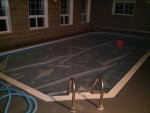Hey Folks,
I purchased a home with an indoor pool around 4 years ago. I'm unsure on it's history, but I have gathered that it has gone a series of different methods of heating it. At one time, it had a solar panel solution, which has since been removed. Some of the plumbing is still attached, and there's some sort of reservoir/heat exchanged underneath.
The pool is roughly 32x16, and about 5' in the middle. I believe it's an 'on ground' style of pool with a deck built around it. Beneath the deck is a crawl space where all the plumbing, filter, pump and stuff resides. This where I discovered the old heat exchanger from the old solar system tucked away in the corner.
Currently, the pool is being heated by a propane heater. There is a loop that runs from underneath the deck, out through a penetration in the wall, where it connects to the propane heater that lives in a small shed beside my house.
The problem is, the winters are cold here, very cold. I don't run the pump all the time, and I had made the mistake, more than once, of forgetting to turn it on before a cold snap. Long story short, this had happened a few times... my bad.. but each time I was lucky enough for the heater to thaw, with no evident damage done.
Well, my luck has run out, and now my heater is leaking water, no doubt from a crack(s) from the cold.
Last year I purchased a variable speed pump in order to keep the water circulating just enough for the water to not freeze. This probably would have protected it from freezing solid, if I hadn't turned it off. But, by doing this I am actively cooling the pool.
I'm sure I will be able to repair/replace the existing gas heater, but I am wondering if an electrical pool heater would be better, installed within the pool room itself to avoid the outside loop all together.
Anyone with a similar situation here? Trying to keep a pool warm in VERY cold weather?

I purchased a home with an indoor pool around 4 years ago. I'm unsure on it's history, but I have gathered that it has gone a series of different methods of heating it. At one time, it had a solar panel solution, which has since been removed. Some of the plumbing is still attached, and there's some sort of reservoir/heat exchanged underneath.
The pool is roughly 32x16, and about 5' in the middle. I believe it's an 'on ground' style of pool with a deck built around it. Beneath the deck is a crawl space where all the plumbing, filter, pump and stuff resides. This where I discovered the old heat exchanger from the old solar system tucked away in the corner.
Currently, the pool is being heated by a propane heater. There is a loop that runs from underneath the deck, out through a penetration in the wall, where it connects to the propane heater that lives in a small shed beside my house.
The problem is, the winters are cold here, very cold. I don't run the pump all the time, and I had made the mistake, more than once, of forgetting to turn it on before a cold snap. Long story short, this had happened a few times... my bad.. but each time I was lucky enough for the heater to thaw, with no evident damage done.
Well, my luck has run out, and now my heater is leaking water, no doubt from a crack(s) from the cold.
Last year I purchased a variable speed pump in order to keep the water circulating just enough for the water to not freeze. This probably would have protected it from freezing solid, if I hadn't turned it off. But, by doing this I am actively cooling the pool.
I'm sure I will be able to repair/replace the existing gas heater, but I am wondering if an electrical pool heater would be better, installed within the pool room itself to avoid the outside loop all together.
Anyone with a similar situation here? Trying to keep a pool warm in VERY cold weather?


